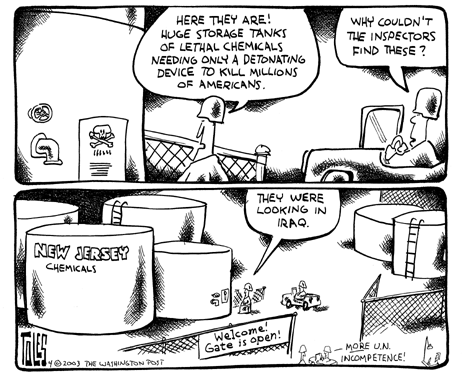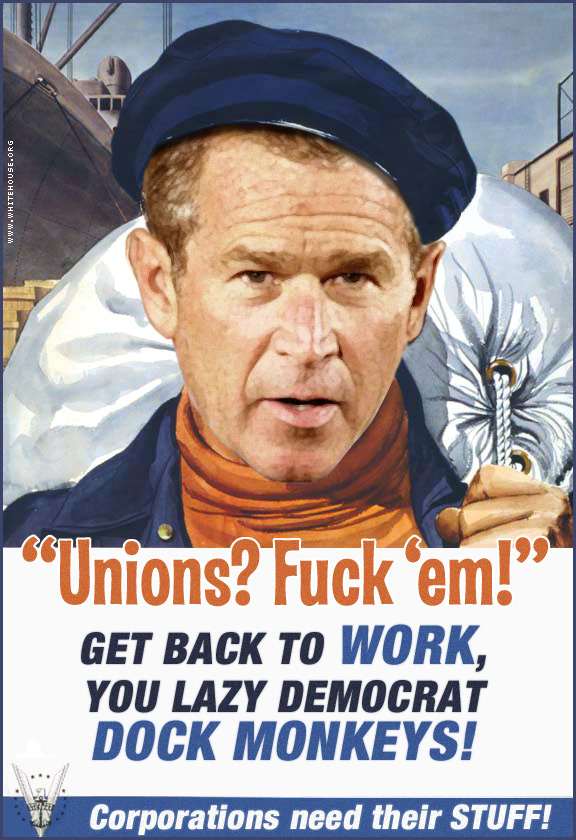OSHA Takes Front Stage in Congress
Tuesday seemed to be OSHA Day on Capitol Hill.
On one side of the Capitol,
Senator Jon Corzine(D-NJ), flanked by his House counterpart Representative
Major Owens (D-NY), introduced S. 1272, the “Wrongful Death Accountability Act” that would among other things, increase the maximum criminal penalty from six months to 10 years in prison for those who willfully violate workplace safety laws and cause the death of an employee.
Evoking the senseless deaths and injuries at McWane Industries, Corzine appeared at his press conference with Pamela Coxe, widow of Alfred E. "Alfie" Coxe.
Coxe was killed three years ago at the Atlantic States Cast Iron Pipe Co. in Phillipsburg. He was run over by a forklift. His widow has filed a lawsuit against the corporate parent, McWane Inc. of Birmingham, Ala.
"McWane just wants the profit ... I'm left picking up the pieces. I don't have a husband. My son doesn't have a father," Coxe said.
In his
statement introducing the legislation, Corzine noted that
Unbelievably, under existing law, that crime is a misdemeanor, and carries a maximum prison sentence of just 6 months. This legislation would increase the penalty for this most egregious workplace crime to 10 years--making it a felony. The bill also would increase the penalty associated with lying to an OSHA inspector from 6 months to 1 year, and would increase the penalty for illegally giving advance warning of an upcoming inspection from 6 months to 2 years.
Meanwhile, on the other side of Capitol, moving full speed in reverse, Congressman
Charlie Norwood (R-GA) was holding a hearing on his bill,
H.R. 1583, Occupational Safety and Health-Fairness Act of 2003, which allegedly "promotes fairness for small business owners who are making good faith efforts to comply with all health and safety laws," but actually will make it harder for OSHA to issue a "willful" citation by changing the definition of a willful violation so that an employer’s “good faith belief in the legality in its conduct” will have more weight than the employer’s knowledge that he or she is violating the law. The definition would also be changed so a violation would not be considered willful if the violation didn’t actually place an employee in harm’s way.
This was the usual Republican version of a balanced hearing: John Molovich of the Steelworkers, "balanced" by a witness from the National Federation of Independent Businesses (NFIB), one from the Chamber of Commerce and one small business owner on his own.
The hearing began with the traditional Republican OSHA bashing ceremony.
In his opening statement, Norwood, a former dentist who has never forgiven OSHA for killing the tooth fairy, complained that
"OSHA regulations are among the most complex and difficult legal requirements imposed on employers today…Many workplace safety and health standards involve understanding very sophisticated technologies. For many employers -- especially smaller employers -- compliance with OSHA regulations is challenging, even with help from experts."
Now, read this carefully. Norwood isn’t saying here that OSHA is being arbitrary or unfair in its enforcement. He’s complaining about the alleged complexity of OSHA standards. So, assuming that OSHA regulations are not just a bunch of busy work and actually have some relationship to keeping the workplace safe,
Norwood is actually saying that health and safety is far too complicated and expensive for small employers. Bad luck for the people who work there.
This statement brought back painful memories of a
ridiculous speech that Secretary of Labor Elaine Chao gave last year to the NFIB (them again.) She had brought along a large stack of federal regulations. Pointing at them, she said:
I’ve brought a piece of that regulatory jungle here with me today.
This big stack is just a few of the labor laws and regulations that you are expected to comply with. You know this—you have to face this every day. I wonder how many of us in government really realize the burden we are asking you to shoulder. Is this the most effective way to protect workers?!
There are more words in the Federal Register describing OSHA regulations than there are words in the Bible. They’re a lot less inspiring to read… and a lot harder to understand!
This is not fair.
It’s not fair that you are expected to know every rule and regulation without any decent help from the people who write them, promulgate them, and penalize you if you aren’t abiding by them!
It’s not fair to you, and it’s not fair to the American worker
So, according to the Secretary of Labor of the United States, it's unfair to expect employers to follow the law.
Let's all remember one thing. It isn't about OSHA or OSHA regulations any more than DUI laws are about the police. It's about the safety of workers. When you start a business, you have a responsibility to run it safely, according to the law -- the same law that applies to all employers, big or small. OSHA's only there to make sure employers follow the law and don't take shortcuts that kill workers, the same reason that the cops are there to make sure no one drives drunk, gambling that they'll get home OK without killing my kids.
Safety Pays?
The NFIB witness, Brian Landon, owner of Landon's Car Wash (
and professional OSHA witness) told the same old tired story:
First of all, we certainly would not want to see family members or friends injured. Secondly, from a business perspective, it just makes sense to avoid injuries.
Now, I think it's be useful to look a bit more closely at these statements because we hear them over and over again at every OSHA hearing from small and large business owners.
Don't get me wrong. I truly believe that Landon doesn't want to kill his employees. No one wants to injure or kill their employees. None of
these employers wanted
these workers to die.
But they also didn't want to go the extra mile to make their workplaces safe. The problem is that left to their own devices, workplace safety becomes a cost-benefit equation, a pact with the devil. "I'll just cut a bit on the safety here and there and hope my luck holds out and nothing happens." Someone who drinks too much, then drives home and kills a family of five didn’t want to kill the family; he was gambling that his luck would hold out.
And does safety pay? Interesting question.
We use it to sell the idea that health and safety regulations are win-win situations – good for workers and good for businesses. I spent a lot of time at OSHA gathering and communicating information about how the using good ergonomic principles have saved businesses money.
They use the "safety pays" mantra to argue that we don't need no stinkin' OSHA regulations and penalties because any good business owner knows that "safety pays." Or they should know. So all we have to do is educate them. Fact sheets, guidelines, consultations, partnerships are all that are needed. Unless and until someone kills a bunch of workers. Then, and only then, we might consider a citation -- but not too much and don't put them in jail. Accidents happen.
Of course, in the real world we also know that safety does
not always pay -- for the employers. Sure, worker injuries and deaths cost the American economy hundreds of billions every year and it's costly and embarassing for individual employers when someone is actually injured or killed.
But who really pays most of the
financial cost of workplace injuries, illnesses and death? (We know who pays the
real costs in injury, illness and death.)
Lisa Cullen, author of
A Job To Die For, wrote an article for the
Synergist entitled "
Safety Pays, Or Does It?" in which she notes that McWane had recklessly injured and killed scores of workers for years without hurting its bottom line. Cullen notes that “In addition to the McWane example, there is stronger proof that safety and health does not always pay.”
We often use and hear the national cost estimate of $170 billion for occupational injuries and illnesses annually. Less well known but equally important is the cost allocation. In the book Costs of Occupational Injuries and Illnesses, the expert team of J. Paul Leigh et al. found that workers’ compensation covered roughly 27 percent of all costs; taxpayers paid approximately 18 percent through Medicare, Medicaid and Social Security; and injured workers and their families paid 44 percent of the costs. If employers are not paying for most—perhaps as much as two-thirds— of their employees’ injuries and illnesses, then on a national level there is no pressing financial incentive to improve workplace safety and health. One cannot argue that safety pays to someone not paying for it to begin with.
The bottom line is that it doesn't matter if safety "pays" or not. It doesn't matter if it's complicated and difficult to make some workplaces safe. What matters is that 6,000 workers are killed in the workplace every year; over 50,000 die from occupational diseases and more than 5 million are injured. We need a strong OSHA to make workplaces safe every bit as much as we need cops to make our streets safe.
So, as the USWA's
John Molovich testified, instead of passing Norwood's bill that will further weaken OSHA, we need to pass laws that will make OSHA stronger. We need to pass Corzine's bill that will increase criminal penalties. And we need to improve whistleblower protection, pass an ergonomics standard and increase OSHA's budget. There's lots of work to be done.


